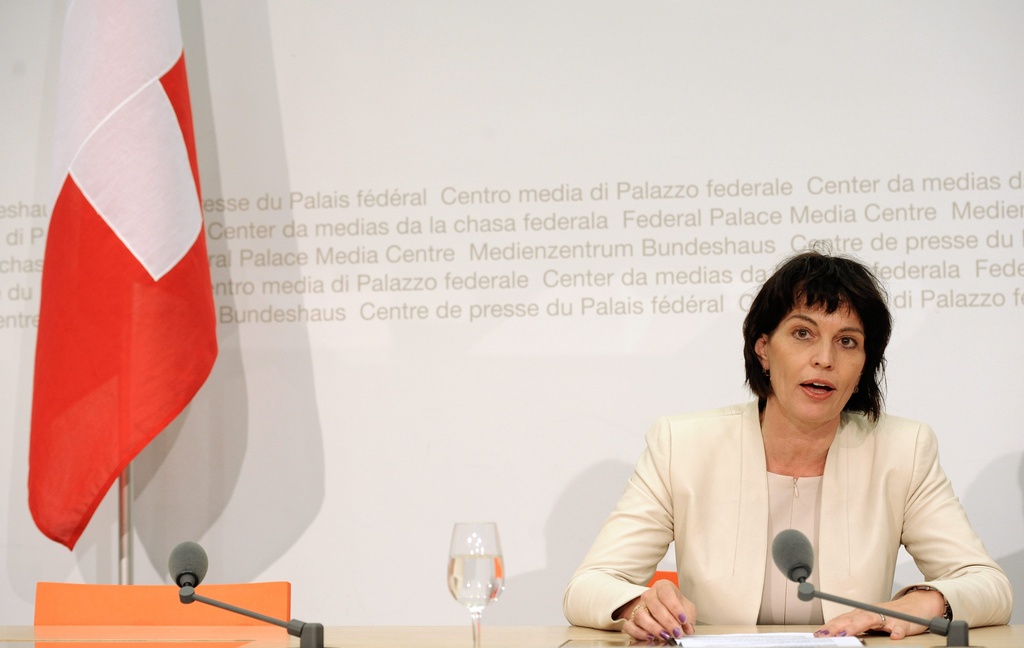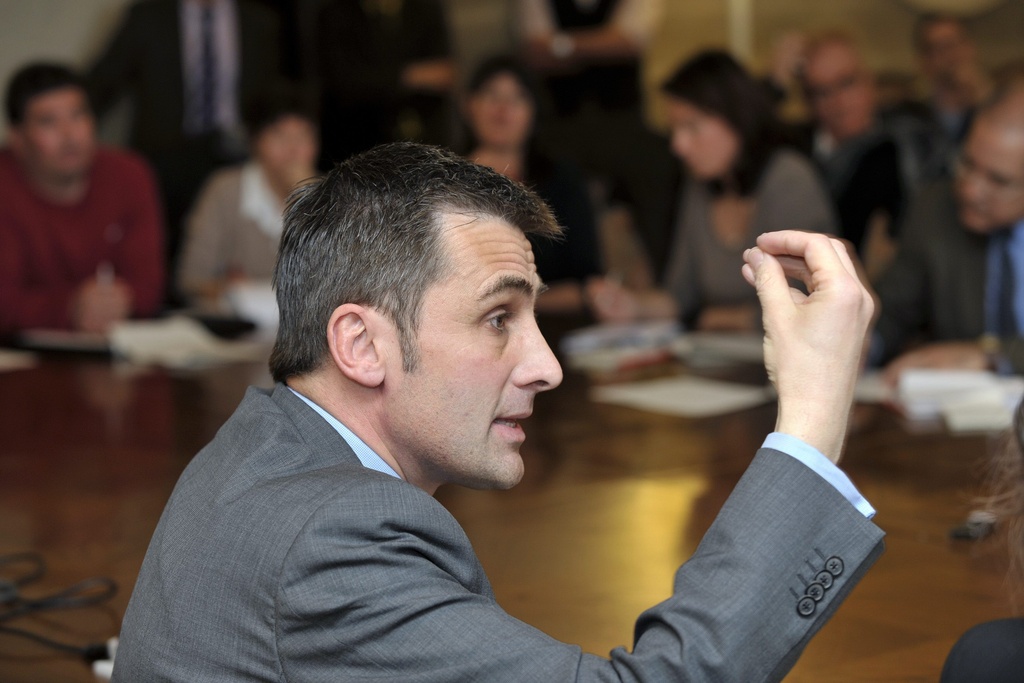Looking back at the Switzerland-Libya dispute

The saga of Switzerland’s soured relationship with Libya is a long one spiced with violence, mugshots, hostages, an embargo and blocked borders.
As the Swiss federal parliament prepares to release its official report on how the crisis was handled, swissinfo.ch takes a look at the history of the strained relationship between the two nations.
The trouble began in mid-July 2008 when Hannibal Gaddafi – a son of Libyan leader Moammar Gaddafi – was arrested and charged with abusing his household staff while staying in a Geneva luxury hotel.
He and his highly-pregnant wife Aline were detained for two days, but later released on bail before leaving Switzerland. Ultimately, the two servants received compensation and withdrew the charges.
Revenge
Outraged by the arrest of his son and daughter-and-law, Moammar Gaddafi initiated several retaliatory political and economic measures.
In addition to threatening to cut oil supplies to Switzerland, Libya forced Swiss businesses to close their offices there and cut the number of Swiss flights to Tripoli at the end of 2008.
The Libyan leader later called for a jihad or holy war against the country.
But even more controversial – the Libyan authorities arrested two Swiss businessmen: Max Göldi and Rachid Hamdani. Initially kept in Libyan prisons, they were later allowed to stay at the Swiss embassy in Tripoli.
Over the course of the next year, a number of Swiss delegations attempted to bring the two men home. In May 2009, Foreign Minister Micheline Calmy-Rey visited Libya and reported “significant progress”.
Yet in June 2009, Libya withdrew most of its assets from Swiss bank accounts and shut down Swiss businesses active there. Swiss President Hans-Rudolf Merz headed for Tripoli in August, where he met the prime minister but not Gaddafi.
Merz signed an agreement to try to normalise relations with Libya within two months and he also apologised for the arrest of Gaddafi’s son. The agreement included the establishment of an international tribunal within 60 days, but it has never met.
Merz returned without Göldi and Hamdani, and into a torrent of criticism and ridicule, as illustrated by some highly unflattering political cartoons. Critics felt he had acted too independently of the cabinet.
Visa woes
September 2009 proved to be a turbulent month after Libya broke its promise to let the two Swiss nationals leave the country by September 1.
On September 4, the Tribune de Genève newspaper printed police mugshots of Hannibal Gaddafi – an action that would later prompt a lawsuit.
Gaddafi and Merz met in September on the sidelines of the UN General Assembly in New York .
Later that same month, Göldi and Hamdani disappeared after being invited for a medical check-up in Tripoli; Bern referred to the incident as a kidnapping. They were not returned to the embassy until November.
By October, the 60-day deadline for normalising relations had passed. The next month, the Swiss government announced that it would pursue visa restrictions for Libyan citizens.
At the end of November a Libyan court sentenced Göldi and Hamdani in absentia – the two men remained in the Swiss embassy – to 16 months in prison and fined them for visa violations.
In December, Hannibal Gaddafi filed a civil lawsuit for breaching his legal protection of personality through the leaked mugshots, demanding SFr100,000 ($95,000).
He sued the Tribune de Genève newspaper, one of the paper’s journalists and canton Geneva. But the case wouldn’t get underway until the new year.
New year, new game
Hamdani’s jail sentence was overturned in January 2010. In February, he was acquitted of charges of conducting business in the country illegally.
Göldi was not so fortunate – his prison term was confirmed. However, it was cut from 16 down to four months.
In mid-February, a Libyan newspaper reported that Switzerland had drawn up a blacklist of 188 top Libyans subject to Europe-wide visa restrictions.
The affair then became a pan-European problem when Tripoli stopped issuing visas to most EU citizens in retaliation for a Swiss imposition of Europe-wide visa restrictions on top Libyans.
In late February, Tripoli granted Hamdani an exit visa while ordering Göldi to report to prison for his jail sentence. Hamdani left Libya.
March saw the start of the Gaddafi mugshot case in Geneva, plus the end of Libya’s visa ban on Schengen citizens. This was thanks to EU presidency-holder Spain, which announced that the visa blacklist against the 188 Libyans had been scrapped.
The Gaddafi clan’s pride was soothed in mid-April, when a Geneva court backed Hannibal Gaddafi’s claim that the publication of leaked police photos infringed his privacy. However, it rejected his claim for SFr100,000 ($95,000) in damages – a sore point to be settled later.
Happy ending?
After nearly two years of detainment – including four months of imprisonment – Max Göldi was released from prison on June 10, 2010. He then checked into a Tripoli hotel to wait for his exit visa.
Two days later, Calmy-Rey arrived in Tripoli – joined by Spain’s foreign minister and Italy’s prime minister for extra support. In Gaddafi’s Bedouin tent, the Swiss and Libyan governments signed a “plan of action” containing a Swiss apology for the publication of Hannibal Gaddafi’s mugshots.
The document noted that if the person responsible for the photo leak was not found and brought to justice, SFr1.5 million ($1.33 million) in compensation would be paid by the Swiss government.
That having been settled, the delegation was able to bring Göldi back home on June 14, 2010.
The government’s crisis management was not the only issue that came under fire in the dispute with Libya. It also came to light that some cabinet members had planned a secret hostage rescue action.
The question of who knew what and when and who gave the order is still not clear.
The issue is likely to be part of a report by the parliamentary control committee, which is looking into the government’s handling of the Libya crisis.

In compliance with the JTI standards
More: SWI swissinfo.ch certified by the Journalism Trust Initiative














You can find an overview of ongoing debates with our journalists here . Please join us!
If you want to start a conversation about a topic raised in this article or want to report factual errors, email us at english@swissinfo.ch.